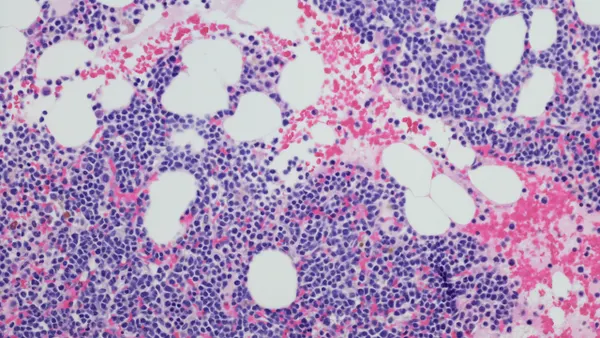Today, a brief rundown of news involving AstraZeneca and Madrigal Pharmaceuticals, as well as updates from Lava Therapeutics, PepGen and Entrada Therapeutics that you might have missed.
AstraZeneca said Wednesday that its experimental drug camizestrant delayed tumor progression in a Phase 3 testing its use as a first-line treatment in people with a certain type of breast cancer. The drug, an oral, hormone receptor protein-degrading therapy known as a SERD, was tested alongside an approved CDK4/6 inhibitor in people whose HR-positive, HER2-negative tumors have an “emergent” ESR1 mutation. People in the study were receiving standard hormone therapy and a CDK4/6 drug and then either continued, or swapped out the hormone treatment for camizestrant, once a tumor scan showed signs of an ESR1 mutation. The result was a “highly statistically significant and clinically meaningful improvement” in progression-free survival for camizestrant recipients, AstraZeneca said. Menarini Group’s similar drug Orserdu is available in the second-line setting, while others from Arvinas, Eli Lilly and Roche are in advanced testing. — Jonathan Gardner
Sales of Rezdiffra, the first approved therapy in the U.S. for the liver disease metabolic dysfunction-associated steatohepatitis, continue to outpace Wall Street’s projections. Madrigal Pharmaceuticals, the drug’s developer, said Wednesday that fourth-quarter and full-year sales in 2024 reached $103.3 million and $180 million, respectively, with more than 11,800 patients on treatment by the end of the year. According to the team at Leerink Partners, general consensus among analysts in January was that the fourth-quarter total would be around $92 million. Rezdiffra could be cleared for use in Europe later this year. — Ben Fidler
Lava Therapeutics is laying off about 30% of its workforce and evaluating strategic options such as a sale or merger, the company said Tuesday. Lava has been developing so-called gama delta T cell engagers for blood cancers, and has partnerships in place with Pfizer and Johnson & Johnson. But the company abandoned one program in December after disappointing study results and, with "only one product in clinical development and an early-stage pipeline," decided it was "appropriate to investigate strategic opportunities," said CEO Steve Hurly, in a statement. — Ben Fidler
Shares of PepGen nearly doubled Monday on early study results suggesting its treatment for a rare form of muscular dystrophy may be as potent as others in clinical testing. Those findings showed a single dose of PepGen’s oligonucleotide-based therapy appeared to help correct an RNA splicing error implicated in the disease. The level at which it did so, at least so far, indicated the drug is “at least competitive” with therapies being developed by Avidity Biosciences and Dyne Therapeutics, with room for better efficacy at higher or additional doses, wrote Leerink Partners analyst Joseph Schwartz. More data are expected later this year and early next. — Ben Fidler
The Food and Drug Administration has cleared Entrada Therapeutics to begin U.S. testing of an experimental Duchenne muscular dystrophy drug that the regulator placed on hold more than two years ago. The FDA in December 2022 halted a planned study of the therapy, which is being developed for a particular genetic subset of Duchenne patients. But while it loosened restrictions on Monday, the agency is still only allowing Entrada to test the therapy in adults, whereas U.K. regulators recently cleared the company to enroll children and adults in a separate trial. After speaking with management, William Blair analyst Myles Minter wrote to investors that Entrada executives “implied that the FDA remains ‘conservative,’” asking the company to accrue data in adults first before greenlighting broader testing. — Ben Fidler













